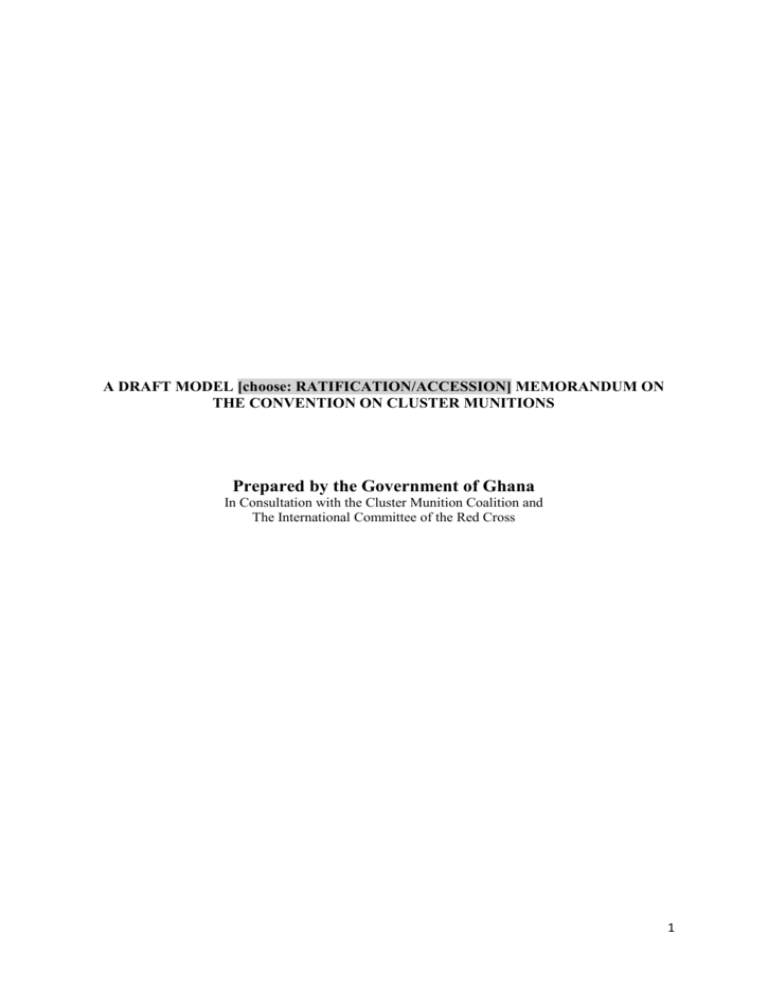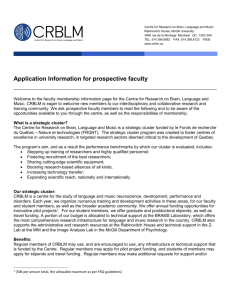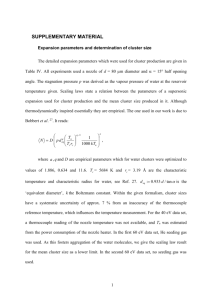English - Cluster Munition Coalition
advertisement

A DRAFT MODEL [choose: RATIFICATION/ACCESSION] MEMORANDUM ON THE CONVENTION ON CLUSTER MUNITIONS Prepared by the Government of Ghana In Consultation with the Cluster Munition Coalition and The International Committee of the Red Cross 1 INTRODUCTION This document is a template memorandum for African states to submit to members of parliament on the occasion of a submission of the Convention on Cluster Munitions for ratification or accession. It is designed to be adjusted to the specific circumstances of the country using it. Grey areas and square brackets indicate the sections that need to be tailored. Those sections in grey that do not apply, as well as all explanatory text in grey or brackets, should be removed before submission ACTION REQUIRED (Select the option applicable for your country) [OPTION A] Honorable Members are respectfully requested to approve ratification of the Convention on Cluster Munitions (CCM), which was signed by [COUNTRY] on [DATE] in conformity with Article [PUT NUMBER] of the Constitution. [OPTION B] Honorable Members are respectfully requested to approve [COUNTRY] accession to the Convention on Cluster Munitions (CCM) in conformity with Article [PUT NUMBER] of the Constitution. BACKGROUND Cluster munitions (also known as cluster bombs) cause serious humanitarian harm to civilians at the time of attack and long after the cessation of hostilities. Cluster munitions’ wide area footprint of destruction – the size of one to two football fields – causes harm when deployed because the weapons cannot distinguish between civilian and military targets within the large strike area. In addition, the failure rate of these weapons is often significant, meaning a large quantity of unexploded submunitions is left behind that continue to kill and injure civilians long after the cessation of a conflict. Cluster munitions also interfere with the return of evacuated, displaced or refugee populations and civilians’ socio-economic activities, such as farming. Recognizing these grave humanitarian consequences, a group of 46 like-minded states led by Norway, as well as the United Nations, the International Committee of the Red Cross (ICRC), the Cluster Munition Coalition and other humanitarian organisations, met in Oslo, Norway, on 22-23 February 2007 to discuss how to effectively address the humanitarian problems caused by cluster munitions. The countries agreed to conclude by 2008 a legally binding international instrument that would: i. Prohibit the use, production, transfer and stockpiling of cluster munitions that cause unacceptable harm to civilians, and ii. Establish a framework for cooperation and assistance that ensures adequate provision of care and rehabilitation to survivors and their communities, clearance of contaminated areas, risk reduction and destruction of stockpiles of prohibited cluster munitions. 2 In pursuit of this aim, a series of global and regional conferences were held for states and other participants to develop and discuss draft versions of a convention. The global conferences took place in Lima, Vienna, and Wellington, and several regional conferences were held, including in Livingston (Zambia) and Kampala (Uganda). At the final diplomatic negotiations in Dublin, states agreed to a new instrument that prohibits cluster munitions, requires destruction of cluster munition stockpiles, and obliges states to clear contaminated areas and provide support to victims and affected communities. A total of 107 States adopted the Convention on Cluster Munitions on 30 May 2008 in Dublin, and the Convention was signed by 94 states during the signing ceremony in Oslo on 3-4 December 2008. The Convention entered into force on 1 August 2010, six months after it was ratified by 30 states. MILITARY UTILITY Cluster munitions are outdated weapons, designed primarily to attack large formations of troops or armed vehicles, and have limited utility in modern warfare, which often takes place in populated areas where combatants and civilians co-mingle. Indeed, the humanitarian consequences of these weapons far outweigh any military utility or benefit. These concerns, exemplified by the massive use of cluster munitions by Israel in Lebanon in 2006 as well as other recent conflicts, provided impetus for the world to ban these weapons. Since then, the global stigma against the use of cluster munitions has grown so strong that today there is a real and significant political cost to using cluster munitions. There has been widespread international condemnation after each of the relatively few incidents of use of cluster munitions in the past several years.1 As well, almost every known or suspected user firmly denied such use, demonstrating the shame associated with using these discredited weapons, even among states not party to the Convention on Cluster Munitions. OVERVIEW OF THE CONVENTION The Convention consists of a preamble and 23 articles. The Convention prohibits the use, development, production, acquisition, stockpiling, transfer or retention of cluster munitions2. The Convention is important for humanitarian law because it both bans an entire category of weapons that have been documented to cause great human suffering and it provides a set of required remedial measures to minimize that suffering where they have previously been used. Thus the Convention contributes to establishing a new and important international norm that should influence the conduct of all parties in future conflicts. Article 1 – Specifies the general obligations and scope of application. It sets out the prohibition of the use, development, production, acquisition, stockpiling, and transfer of cluster munitions, as well as any assistance with any prohibited act, under any circumstances. Article 2 – Contains definitions, including the definition of a cluster munition. 1 In recent years, there has been confirmed use of cluster munitions in Georgia (2008), Cambodia (2011), Libya (2011 and 2015), Syria (2012-15), South Sudan (2014) and Ukraine (2014-15). 2 Exempted from the ban are transfers for the purpose of destruction, as well as limited retention for training and development of demining techniques or for the development of cluster munition counter-measures. 3 Article 3 – Requires States Parties to destroy their stockpiles of cluster munitions within eight years. Article 4 – Requires States Parties with cluster munition contamination to clear and destroy all cluster munitions remnants in areas under its jurisdiction or control within ten years. Article 5 – Requires affected States Parties to provide assistance to cluster munition victims in areas under their jurisdiction or control, in accordance with international humanitarian and human rights law. Article 6 – Requires all States Parties in a position to do so to provide international cooperation and assistance to other States Parties to help them meet their obligations under the Convention. Article 7 – Requires States Parties to submit a report pertaining to all Convention requirements to the Secretary-General of the UN as soon as practicable but not later than 180 days after entry into force of the Convention for those States Parties, and to provide annual updates thereafter. Article 8 – Lays out a cooperative mechanism to promote compliance with the Convention. Article 9 – Requires States Parties to take legal or other measures at the national level to implement the Convention, including penal sanctions for violations of its prohibitions. Article 21 – Provides rules governing relations with states not party to the Convention. It permits participation in military operations with states that are not parties to the Convention, though within strict limits that do not allow assistance with prohibited activities. It also requires States Parties to promote the norms of the Convention, to do their best to discourage any use of cluster munitions, and to encourage states that are not parties to ratify, accept, approve, or accede to the Convention. Article 10 – 20 and 22 – 23 – Contain administrative provisions. OBLIGATIONS FOR [COUNTRY] (Select the option applicable for your country) [OPTION A] For states without stockpiles and not affected by cluster munitions: [COUNTRY] is not a documented stockpiler, producer, or user of cluster munitions or a country affected by cluster munitions. Obligations are therefore minimal, including developing national implementation measures and providing initial and annual transparency reports. [OPTION B] For states that have stockpiles and/or former producers: [COUNTRY] must destroy its stockpiles of cluster munitions as soon as possible, and no later than eight (8) years of becoming a State Party to the Convention. Article 6 of the Convention entitles all States Parties to seek and receive assistance with its Convention obligations, including stockpile destruction, which should help [COUNTRY] carry out the 4 stockpile destruction in a timely manner. [For producing states, add: As production of cluster munitions is banned under the Convention, [COUNTRY] must also convert or decommission its production facilities.3] [OPTION C] For states that are affected by cluster munitions and/or have cluster munition victims: [COUNTRY] must clear all areas with cluster munition remnants as soon as possible, and no later than ten (10) years of becoming a State Party to the Convention. (It also has the duty to provide support for, and protect the rights of, all victims of cluster munitions in areas under its jurisdiction or control.) Article 6 of the Convention entitles all States Parties to seek and receive assistance with its Convention obligations, including clearance (and victim assistance), which should help [COUNTRY] carry out the clearance (and victim assistance duties) in a timely manner. Being a State Party entitles [COUNTRY] to not only financial assistance, but also technical and material support. In addition, [COUNTRY] will become part of the community of states that meets regularly to discuss how to make progress in such areas in the most efficient and effective manner, allowing them to benefit more generally from the experience and expertise of other states and engaged actors. Additional implications of joining the Convention Article 1, paragraph 1 (c), of the Convention stipulates that “it is prohibited to assist, encourage or induce anyone to engage in any activity prohibited under the Convention”. Therefore, in the event that our military personnel are invited to join AU or UN operations, it will be difficult to guarantee that [COUNTRY] soldiers and officers will not become involved in situations that could involve the use of cluster munitions by a non-state party. The Convention permits mere participation in joint operations with states not party that may use cluster munitions and thus does not interfere with [COUNTRY] joining AU or UN operations. The Convention, however, prohibits our soldiers and officers from use, transfer, or stockpiling of cluster bombs during these joint operations and prohibits assistance with regard to any of those acts. In fact, after a state joins the Convention on Cluster Munitions, its soldiers are legally obligated to refuse to obey an operational command to use cluster munitions. In addition, the prohibition on assistance with use, stockpiling, or transfer signifies that [COUNTRY] may not allow foreign states to stockpile cluster munitions on areas under its jurisdiction or control. Nor may it permit foreign states to transport cluster munitions over, on, or through areas under its jurisdiction or control. The prohibition on assistance with production pertains to the development and manufacture of cluster munitions, and means there should be no investment in cluster munition producers by any entity under [COUNTRY]’s jurisdiction or control. [COUNTRY] is also obligated to promulgate and implement national legislation in line with Article 9. Finally, [COUNTRY] shall promote the universalization and norms of the Convention in accordance with Article 21. 3 Only applicable for South Africa. 5 Article 18 invites a State to declare upon ratification (acceptance, approval or accession) that it intends provisionally to apply the Convention’s general obligations (contained in Article 1) pending entry into force for that State. JUSTIFICATION FOR [choose: ACCESSION/RATIFICATION] (Select the option applicable for your country) [OPTION A] For states without stockpiles and not affected by cluster munitions: 1. Although [COUNTRY] has not acquired, stockpiled, or manufactured cluster munitions, and is not contaminated or otherwise affected by cluster munitions, it should join the Convention on Cluster Munitions to maintain our reputation and culture as a country that champions disarmament and peaceful causes in the international arena. [OPTION B] For states that have stockpiles and/or former producers: 1. As a country with a stockpile of cluster munitions, [COUNTRY]’s [choose: ratification of/accession to] the Convention is particularly important to ensuring no future use of this weapon, and will help to maintain our reputation and culture as a country that champions disarmament and peaceful causes in the international arena. 2. [Add as applicable: As a signatory state,4 [COUNTRY] must already abstain under international law from acts inconsistent with the purpose of the Convention, including use or transfer of cluster munitions.][Add as applicable: [COUNTRY]’s stockpiles are essentially without value given the enormous political costs that would stem from any future use or transfer. 5] Continued stockpiling therefore will only lead to continued stockpile maintenance costs, whereas becoming party to the Convention should lead to support for destroying stocks. [OPTION C] For states that are affected by cluster munitions and/or have cluster munition victims: 1. [COUNTRY]’s [choose: ratification of/accession to] the Convention sends a clear message to the international community that those states that have suffered from the past use of these weapons want the ban to be universal and signals their commitment to take action against these weapons. [ADDITIONAL POINTS FOR ALL STATES] 2. Additionally, [COUNTRY] must [choose: ratify /accede to] the Convention to contribute to the emerging international norm against the production, stockpiling, transfer, and use of cluster munitions by anyone at any time. [For stockpilers, add: Such a signal is particularly strong coming from a state that currently has a stockpile of cluster munitions [For past users, add: and has used them in the past6]. 4 For states needing to ratify the Convention. For states needing to accede to the Convention. 6 Relevant for Libya, Morocco, Nigeria, South Africa, and Sudan 5 6 3. [COUNTRY] needs to [choose: ratify/accede to] the Convention because of the great havoc and suffering caused by cluster munitions on civilian populations [for affected states, add: in our country and] around the world, especially on women and children, both during and long after cluster munition attacks. 4. The only adequate response to the suffering caused by cluster munitions is the full universalization of the Convention. 5. [COUNTRY] should therefore act pro-actively by [choose: ratifying/acceding to] it to prevent future human suffering from the use of cluster munitions and to demonstrate solidarity with those communities [for affected states, add: , in our own country and around the world,] that have suffered from past use of these indiscriminate weapons. 6. [COUNTRY] needs to [choose: ratify/accede to] the Convention in keeping with our foreign policy of peace promotion, peaceful co-existence and international co-operation. 7. The [choose: ratification of/accession to] the Convention by [COUNTRY] will pro-actively serve as a deterrent to other governments from using these weapons. 8. As the Convention requires states to criminalize the use of cluster munitions by all actors in all circumstances, the [choose: ratification of/accession to] the Convention will deter the future use of any actors in [COUNTRY] and elsewhere, including by armed non-state actors involved in intra-state and inter-state wars. 9. By [choose: ratifying/acceding to] the Convention, [COUNTRY] will greatly contribute to establishing a cluster munition-free Africa and therefore to supporting our quest for peace and development on the continent. IMPLEMENTATION PLAN [COUNTRY] is obliged under Article 9 of the Convention to have national legislation to give effect to the Convention. In this regard the Attorney General’s Department will be duly consulted after the [choose: ratification of/accession to] the Convention for the development of a national law and other relevant measures to be put in place. [Add as applicable: The law must not only cover the acts prohibited by the Convention, but should also cover States Parties’ positive duties, such as the timely destruction of stockpiles, the timely clearance of areas with cluster munition remnants, and the provision of assistance to cluster munition victims.] FINAL IMPACT 7 [Choose: Ratification/accession] will further boost the image of the country as a champion of peace and disarmament, and we will gain considerable international goodwill. Each state joining the Convention [for stockpiling/user states and/or affected states choose: ,especially those that have stockpiled (and used 7 ) cluster munitions in the past and/or especially those that have suffered from the past use of cluster munitions,] also sends a strong message to states still not party that the use of cluster munitions is unacceptable and is no longer tolerated by the international community. RECOMMENDATION On the basis of the above, I wish to respectfully request the Honourable Members to consider and approve [choose: ratification of/accession to] the Convention on Cluster Munitions as a matter of priority for [COUNTRY]. Respectfully submitted. MINISTER FOR…………… 7 Relevant for Libya, Morocco, Nigeria, South Africa, and Sudan 8






